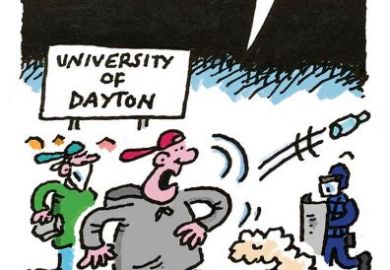
A new report has highlighted how important it is for universities to tackle the issue of student mental health. A survey by myunichoices.com found that a third of students who dropped out of university did so for mental health reasons, The Independent reported. The survey of 510 adults who did not complete their studies at university also found that one in five suffered from alcohol or drugs abuse as a result, and half of those who dropped out felt like a failure. The same number regret deciding to leave university, it found, highlighting how important it is to provide support for students. The report also found that just over a quarter felt that the course advice they received was poor, and an equal number felt pressure from parents to choose a course that would lead directly to a good job.
The Trump administration’s crackdown on academics with ties to China has had further reaching consequences than the US president could have imagined. Weihong Tan was once a professor at the University of Florida, but he was forced to move back to China because of the US’ investigations into academics allegedly hiding Chinese funding or affiliations with Chinese universities. Now working at Hunan University, Professor Weihong has created a fast test for the coronavirus after pivoting from diagnosing and treating cancer to working on Covid-19. Testing is vital to stem the flow of the virus, epidemiologists have said, and Professor Weihong’s test produces results in 40 minutes and can be performed in a doctor’s office or in non-medical settings such as airport screening areas. “In the name of safeguarding American science, federal agencies are driving out innovators, who will then make their discoveries and insights in China instead of the US,” writes ProPublica.
The UK’s higher education technology body, Jisc, has issued a collective call to all providers of digital content and software to support institutions through the Covid-19 crisis by making their content open access. As universities are forced to take their teaching online as the outbreak spreads and academics scramble to research the virus, Jisc, alongside its partners such as Research Libraries UK and the British Library, has asked providers to waive contract restrictions, credit limits and restrictions on remote access. In a statement, it also asked that any relevant content and data sets about Covid-19, coronaviruses, vaccines or antiviral drugs behind subscription-only paywalls are made open access immediately.
With campuses closed and travel restrictions tightening during the Covid-19 crisis, it is going to be a fairly quiet time for UK student societies, particularly UN Women Oxford, which has been barred by University of Oxford authorities over its decision to cancel a speech last month by former home secretary Amber Rudd, according to MailOnline. The move, which related to the ex-minister’s role in the Windrush scandal, sparked fury, particularly after Ms Rudd’s talk was cancelled with just 30 minutes’ notice. Proctors Martin Maiden and Sophie Marnette ruled that the “cancellation of this event was not carried out in accordance with university procedures”, adding that “the society will be de-registered with the proctors”. The proctors also directed the society, which has since changed its name to United Women Oxford Society after it was condemned by the UN Women UK charity, to issue an apology to Ms Rudd.
The refusal of some US college students to cease their spring break partying has sparked fears that they could become coronavirus “super-spreaders”, Politico reported. While many US cities were entering lockdown, hundreds of thousands of spring breakers in Florida ignored calls for social distancing and continued to “cram four and five to a hotel room, swarm beaches over hundreds of miles of coastline, and gather shoulder-to-shoulder in bars and clubs,” the website reported. With party-loving students now retuning to their hometowns, their refusal to heed medical warnings could prove “nothing short of tragic”, said Gregg Gonsalves, professor of epidemiology at the Yale School of Public Health. “While many of us have been hunkering down to try to break the chains of infection in our communities, these young people have decided the pleasures of the moment are worth bringing back the coronavirus to their friends and family,” he said.
With international travel banned by many countries until further notice, will the university branch campus make a comeback? If so, Central Queensland University’s new campus in Indonesia, which opens in July, could be an unlikely beneficiary. While it only has room for 300 students on its 18th-floor campus in Jakarta, Australia’s largest regional university has the option of expanding to other floors if demand is high. Whether its décor, which, according to The Australian, is “replete with kitsch, Jurassic-sized fibreglass kangaroos and koalas” proves a hit with students remains to be seen.
Register to continue
Why register?
- Registration is free and only takes a moment
- Once registered, you can read 3 articles a month
- Sign up for our newsletter
Subscribe
Or subscribe for unlimited access to:
- Unlimited access to news, views, insights & reviews
- Digital editions
- Digital access to THE’s university and college rankings analysis
Already registered or a current subscriber?



